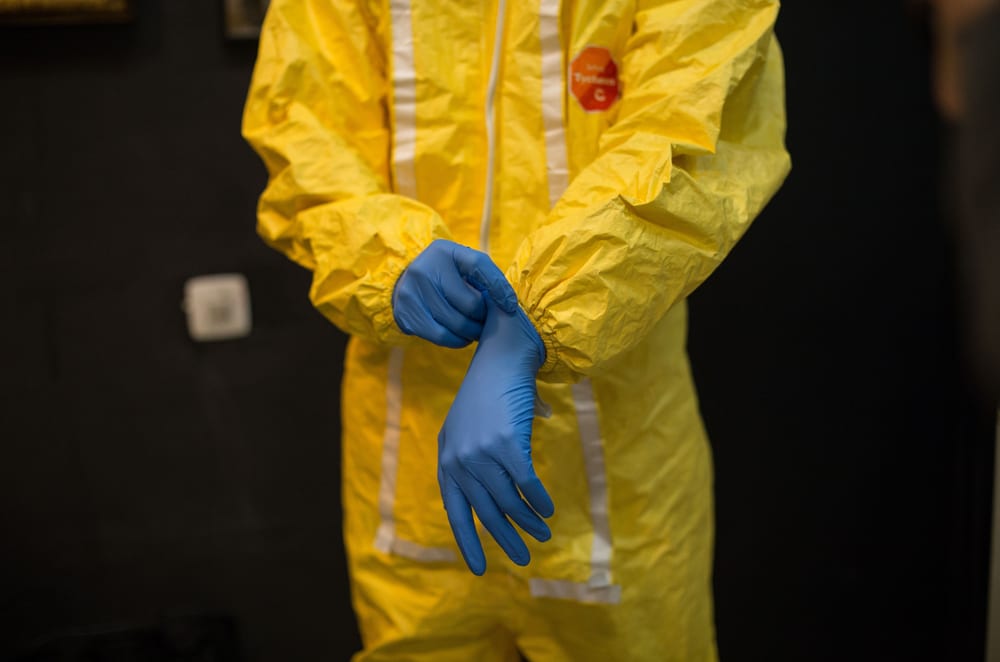Biohazards are any substance that is dangerous to humans and pets. These include bloodborne pathogens like hepatitis and MRSA that are highly infectious. Due to the health risks, you should never attempt to clean up biohazards on your own. Our overview of how to clean up biohazards explains these risks and outlines the biohazard cleanup process.
How to Clean Up Biohazards
- Assess the Scene – Inspect the scene to determine the extent of the damage and create a cleanup plan.
- Safety Protocols – Prevent the spread of contaminants by quarantining the area with plastic sheeting.
- Disposal of Contaminated Materials – Remove contaminated materials from the scene and dispose of them according to local regulations.
- Biohazard Disinfection and Deodorizing – Clean, disinfect, and deodorizing the contaminated area following industry-standard practices.
- Removal Path Cleanup – Disinfect and remove the safety barriers along the exit path.
- Safe Disposal and Breakdown – Dispose of all contaminated materials and breakdown or pack up the remaining equipment.
- Restoration and Reconstruction – If necessary, restore the area to the original condition prior to the contamination.
What are Biohazards
Biohazards are any substance that poses a health risk to humans or animals. In most instances, they refer to bloodborne pathogens that infect humans like hepatitis, MRSA, and HIV. This includes blood as well as other bodily fluids that may transmit these diseases. Materials saturated with biohazards are equally dangerous.
Who to Call to Clean Up Biohazards?
Since biohazards are dangerous, you should never clean them yourself. Even gloves and a face mask do not provide adequate protection against possible contaminants. You are more likely to infect yourself during the process than clean up the biohazard.
Attempting biohazard cleanup greatly increases the risk of spreading the contamination. Additionally, do not use regular cleaning services or maids. Cleaning up biohazards requires the right training and equipment.
For that reason, a qualified biohazard cleanup company is the only safe, reliable option to consider. They have the training and equipment necessary to effectively clean up biohazards as well as prevent further contamination.
The Most Common Biohazard Situations
While there are virtually unlimited causes of biohazard contaminations, these are some of the most common. Unfortunately, most biohazard situations are both tragic and traumatic.
- Unattended Death – When someone passes away alone and is not discovered for a period of time.
- Suicide or Homicide – When someone passes away by their own actions of the actions of another individual.
- Violent Crimes – When someone is severely injured by another individual.
- Accidents – When someone is severely injured, such as with power tools or machinery.
The Process of Cleaning Up Biohazards
Cleaning up biohazards requires the right training and equipment to prevent the spread of contaminants. Although the exact process may vary from company to company, the process is usually very similar.
1. Assess the Scene
Your biohazard contractor will assess the scene to determine the extent of the damage. From there, they will decide on how to proceed with cleaning up biohazards.
2. Safety Protocols
Once you authorize the work, the contractor will begin with safety protocols. Then they quarantine the area around the biohazard with plastic sheeting and bio-tape. This creates a removal path to the contaminated space. The removal path prevents accidental contamination while removing materials.
3. Disposal of Contaminated Materials
Next, they remove contaminated materials from the area. Depending on the situation, this may involve cutting out sections of drywall or carpeting. They place items in biohazard bags and remove them from the scene. They also remove hard to disinfect items, such as furniture and mattresses.
4. Biohazard Disinfection and Deodorizing
Next, they will clean, disinfect, and deodorize the area. Disinfection is usually a multistep process and your biohazard cleanup company will use several chemicals. They use commercial or hospital-grade disinfectants to kill remaining pathogens. Deodorizers are sprayed throughout the space to prevent odors from developing over time.
5. Removal Path Cleanup
The removal path is then disinfected and systematically removed. This ensures other areas are not contaminated as a result of the cleanup.
6. Safe Disposal and Breakdown
Biohazards are disposed of according to local regulations and industry-standard practices. They also clean and disinfect equipment before packing it up.
7. Restoration and Reconstruction
Depending on the situation, reconstruction services might be necessary. This may involve painting walls, refinishing wood, laying carpeting, or hanging drywall. Your biohazard contractor will explain the restoration phases prior to beginning work.
Get Biohazard Cleanup Services Now
Get the help you need to effectively and safely clean up biohazards. Let the specialists at Restoration Local assist you during this traumatic and stressful time. Call 1-888-443-3110 now for emergency biohazard cleanup service and a free estimate.





